- Home
- Carl Deuker
Painting the Black Page 18
Painting the Black Read online
Page 18
I asked for Detective Langford, but the voice on the other end said she wasn’t in. “Give me your name and number and I’ll have her call you.”
I swallowed, and gave my name. “I’d like to talk to her right away,” I added.
“Is this an emergency?” the voice asked.
I told him I wasn’t sure.
His voice was gruff. “Is somebody going to die if she doesn’t call you back in the next five minutes?”
“No,” I answered.
“Then she’ll call you tomorrow morning.”
Before I could say another word, he hung up.
I sat there holding the dead telephone, my whole body numb. Then I almost laughed out loud. You get it in your head that what’s happening to you is the most important thing in the world. I had this stupid movie vision of Detective Langford waiting at the station for my call. She’d hear my voice and she’d rush out to her car and race over to get my statement. What an idiot I was! She must have hundreds of cases to worry about—and every one was probably more serious than what Josh had done! She might have forgotten all about it. I felt like a fool, an absolute fool.
Still, all that evening I was jumpy, and the three or four times the phone rang I popped up to get it. None of the callers was Officer Langford.
Around nine o’clock Grandpa Kevin came upstairs and knocked on my door. I really didn’t want to talk to anybody. Had he been my mother or father I would have told him that straight out, but I couldn’t say it to him.
“You got a minute?”
“Sure,” I said, but he must have heard the doubt in my voice.
“I won’t be long. I know you’ve got things on your mind.”
“That’s okay. What is it?”
“I just wanted you to know you’re a terrific catcher.”
I shrugged. “When you’ve got a pitcher like Josh Daniels—”
He didn’t let me finish. “When you’ve got a pitcher like Josh, it’s harder. He’s out there on the black all the time, and you’ve got to frame the ball just right, or the umpire won’t give you the call. Remember, I was a catcher too. I know the game.” He paused. “You’re a good ball player, the kind of ball player I’d like to think I was.”
“Thanks, Grandpa,” I said softly.
He stood. “Well, that’s all I wanted to say.” He headed to the door.
I had a sudden desire to tell him everything. “Grandpa Kevin,” I said as he stood in the doorway.
He turned back to me. “Yes, Ryan?”‘
I could feel the kindness in his soft gray eyes. Too much kindness. “Thanks again for the gear and for your help and everything.”
“Sure, Ryan. It’s been my pleasure. Watching you play has given me a chance to relive a part of my own life.”
I felt numb walking to school the next morning. It was hard to believe that it was all going to be over soon. I was sure something would happen first period, but nothing did. Second period came and went. Still nothing. I wondered if the message had gotten lost, if I should call again. Then, during the passing period, Mr. Phelps tapped me on the shoulder. “Mr. Haskin wants you in his office.” I must have looked blank. “Did you hear me?”
“Yeah,” I said. “I heard you.”
I could hear voices as I tapped on Haskin’s door, so I knew he wasn’t alone. But I didn’t expect what I got when I opened the door.
Everyone was there. Mr. Haskin, Detective Langford, Coach Wheatley, Mr. and Mrs. Roby. I felt cold suddenly, looking at them.
“Sit down, Ryan,” Mr. Haskin said, nodding toward a chair right in the middle of the room.
I sat. For a long moment no one said anything. Then Detective Langford took out her yellow notebook and flipped to a clean page. “I believe you have some information you’d like to share.”
When I finished, they took turns saying all the expected things: “We’re glad you came forward.”. . .“We know this took courage.”
But I was nobody’s hero anymore. I was just another confused kid who didn’t know what he was doing. I didn’t leave anything out, but they didn’t believe me, at least not one hundred percent. I could see the mistrust in their eyes, especially in Mr. and Mrs. Roby’s.
“You can go back to class,” Mr. Haskin said. “You’re all done for now.”
But I wasn’t done. Coming out of Haskin’s office, I knew there was something else I had to do. I had to be the one to tell Josh. I figured they’d call him to the office right away. He had history in Room 24, so I hung out at the end of the twenty-wing hallway.
I wasn’t there more than a minute when a door opened and he came out. When he saw me, the color drained out of him. “You did it, didn’t you? You sold me out.”
“I told them the truth, Josh.”
He looked away from me for an instant, then pounded his hst hard against one of the lockers. The noise was like a gunshot. I jumped a little. He looked back at me. “You could have been part of a championship team, you know. All you had to do was keep your mouth shut. Now it’s gone. All of it. Not just for you, but for everybody. You trashed it for nothing.”
He stared at me for a long moment. Then he walked by me toward the office. I watched him until he’d gone around the corner and out of sight.
14
I don’t know when it hit me that the baseball season wasn’t over, that I had practice that afternoon and a game on Saturday. When it did, I went lightheaded. For a second I thought about quitting the team, about walking away from it all. I’d faced Josh, but I wasn’t sure I had it in me to face the rest of the team. I only thought that way for a second, though. You start something, you finish it.
Word gets around a school fast. By lunch time Santos and Ruben were on me, asking me where Josh was and what I’d told the police.
“I don’t want to talk about it,” I said.
“What’s that supposed to mean?” Ruben snapped.
“It means I don’t have anything to say.”
They glared at me, their mouths open in disbelief. But finally they gave up and walked away.
It only got worse. Dressing for practice after school, all the guys were talking about Josh, how he’d been called out of class and hadn’t come back. Wilkerson said that someone told him they saw a police car drive off with Josh in the back seat. Bayne said that wasn’t true, that Josh’s parents had come and gotten him. It seemed like everybody knew something.
“Ryan knows what’s really going on,” Santos said loudly, “only he’s not saying.”
In a flash, all eyes were on me. I sat up straight and looked around the room, looked at every one of them.
“That’s right,” I said. “I’m not.” Then I pulled my shoelaces tight, double-knotted them, grabbed my mitt, and headed outside.
When I took the field I had nobody to warm up with. I remembered that first day of tryouts, how the exact same thing had happened, and how Josh had come over and rescued me. Only it wasn’t the same thing, it wasn’t the same thing at all, because now I didn’t need rescuing.
I stretched my legs and my back, then ran in place for a few minutes. I’d barely broken a sweat when Wheatley came out of the coach’s office. He blew his whistle and motioned for us to come forward. His face was grim and he stood almost at attention.
He said what I knew he’d say. Josh had been suspended from the team for assaulting a female student. If anybody else was involved, he wanted that person to come forward. Guys looked around at one another, wondering who it might be.
“I’m not going to pretend that losing Josh isn’t a blow to our team,” Wheatley went on. “We all know what kind of pitcher he is, how much he has meant to us. But we can’t quit. Starting right now, with today’s practice, each and every one of us is going to have to dig a little deeper, give a little more. So let’s get out there and do it.”
A couple of guys cheered then. But most were too stunned to do anything but stand. It wasn’t until Wheatley strode toward the center of the diamond that everyone moved.
>
That practice wasn’t good. Not for me, not for anyone. The fielding was sloppy and the hitting was bad. Guys kept forming into clumps of two or three. They’d talk behind their gloves and kick at the ground until either Wheatley or Cliff would yell at them and get them shagging balls or running in the outfield. The two hours seemed like ten.
In the locker room afterward I could feel Ruben’s eyes on me, and Chang’s, and Santos’s, and other guys’. They knew what I’d done. I don’t know how they knew, but they knew. I could feel their anger.
I did everything at my normal pace. If anything I took longer. I’d been hiding for too long, and I was done with it. Not one of those guys said a word to me. Not one. When I looked them in the eye, they were the ones who looked down and away. And when I left the locker room, Ruben moved aside to let me pass.
My work wasn’t over, either. I still had to tell my parents and Grandpa Kevin. Walking home I thought about waiting until after dinner, or maybe even until the next morning. But I wanted to get everything over with. I had to get everything over with. So as soon as I stepped through my front door, I told them the truth.
By the time I finished, my father’s face was beet red. “I can’t believe you let me say those things to Officer Langford! I can’t believe you sat there and let me make an idiot of myself!”
“I’m sorry,” I said.
That made him angrier. “Sorry! You’re sorry. Well, that’s just great.”
My mom came to my defense. “The important thing is that in the end he told the truth.”
My father scowled. “Yeah? Well, it would have been nice if he’d told the truth in the beginning.” He stared at me long and hard. “I’ll call Officer Langford tomorrow and apologize,” he said at last. Then he turned and went into the kitchen.
My mother followed him, leaving me alone with Grandpa Kevin. I sank back into the sofa, exhausted. For a while neither of us said anything. Then I took a deep breath and exhaled. “I’ve really made a mess of things, haven’t I?”
He shrugged. I think he might have even smiled. “Don’t be so hard on yourself. Everybody makes a mess sometimes. At least you’re trying to clean yours up.”
After dinner I went straight to my room, lay on my bed, closed my eyes, and tried to relax. The hardest part was over. I’d done it and I’d never have to do it again.
But instead of feeling better, I felt worse. Waves of panic swept over me. I wanted desperately to go back and undo everything. Then I pulled myself together. I told myself I’d done the right thing, the only thing. The panic passed, only to come back again minutes later.
15
It took me forever to fall asleep and stay asleep, which actually worked out. The game was at noon Saturday. I woke up so late that by the time I’d finished eating breakfast it was time to go.
My father drove me to the Crown Hill parking lot, where the team bus was waiting. In the car I could feel him wanting to say something, but he never did. Just before I got out, he reached over and rubbed the top of my head. “I’ll be cheering for you today.”
The locker room of the gym was open. I went inside, grabbed my equipment bag, then returned to the parking lot. The big yellow bus was sitting there, empty. All the guys were standing around outside, talking.
I hung back, off by myself, until Wheatley called out that it was time to go. Then I was the first to get on. I felt shaky and hot, as though I had a fever, and I was glad to be able to sit down.
I took a seat about halfway back. As the other guys boarded, I stared out the window. The seat next to me was empty, and I figured it would stay empty.
But I was wrong about that. As the engine of the bus started up, Chris Selin slid in next to me. “You mind if I sit here?” he asked.
“No,” I said, hoping my voice sounded normal. “Not at all.” Then we were off, bumping down Sixty-fifth toward the freeway.
The bus was real quiet. Some guys talked, but only in whispers, as if we were all headed to a funeral.
It wasn’t until we reached Boeing Field that Selin spoke. First it was nothing stuff. The weather, Cheney Stadium, graduation. But it felt good to know there was somebody on the team who would talk to me, even if it was about nothing.
“Let me take a look at your hands,” Selin said as we took the freeway exit that led to Cheney Stadium.
It was such a strange, unexpected request that I wasn’t sure I’d heard him right. “My hands?”
“Yeah. Let me see them.”
I held them out in front of me. It was the first time I’d looked closely at them in months, and what I saw startled me. The palm and all the fingers on my left hand were swollen and slightly blue. On my right hand two of my knuckles were huge, almost twice their normal size. A long scab ran across the back of my hand, and the skin under three of my fingernails was deep purple. My little finger seemed bent, as though I’d broken it.
“They’re even worse than mine,” Selin said, holding his out for me to see.
“I don’t know,” I said, looking at all the swelling. “Yours are pretty ugly too.”
We both stared at our hands for a minute. Then Selin’s voice went serious. “A lot of guys on this bus think you let us down. I’m not one of them. I know what you did for us this year. And I know what you did for Josh, even if he doesn’t. It’s right there, in those hands. And in your sore knees and your stiff ankles. It was Josh who let us down, not you. That’s why no one’s ever going to say a bad word about you in front of me and get away with it.”
When he finished, both of us sat completely still for a moment. I’m not sure what I would have said if he’d stayed. I’d like to think I would have thanked him, but I’ll never know, because he stood and quickly moved to an empty seat at the back of the bus.
It’s easy to say that you don’t care what the world thinks of you, that you live only for yourself. It sounds strong and tough, and like a man. But there are times when you need a good word from somebody. For me that was one of those times. I didn’t feel good when I got off the bus, but I felt better than I had. I owe that to Chris Selin.
I don’t know how to describe the game. It was as if we were there, but we weren’t there. From the start Reule couldn’t get the ball over the plate. He fell behind every batter, and then he’d have to come in with some fat pitch down the heart of the plate. The Yakima hitters pounded base hits to all corners of the park. But it wasn’t just Reule; it was everybody. We made two errors in the first and two more in the second. By the third we were down 8–0. Wheatley had no choice but to bring in Wilkerson, and then Smith. Nothing worked. For them it was like batting practice. For us it was a long nightmare that wouldn’t end. Wheatley sent me up as a pinch hitter in the seventh. It was a nice thing to do. It let me know he wasn’t holding anything against me. I wanted to pay him back with a solid hit somewhere, but I struck out on a curve that bounced up to the plate. The final score was 14–2.
In the clubhouse afterwards Wheatley gave a little speech. He told us we had nothing to be ashamed of, and he thanked us for giving him a great ride. Then he said we could go home with our parents if we wanted. I think just about everybody did. An hour bus ride together after getting pasted didn’t sound like much of a trip.
My parents and Grandpa Kevin were waiting just outside the gate. “I’m sorry,” my mom said, and she gave me a hug. Then we walked together to the car. I got in and pulled the door closed.
The season was over.
16
For the next couple of days I kept my eye on Josh’s house. Sometime or other, I’d have to talk to him again, and I wanted to get it over with. At night I’d see a light in his window, so I knew he was there. But during the day he must have been lying low, because he was never in front of his house or at the Community Center or anywhere.
After school on Wednesday, Officer Langford called. “It’s all settled. Josh has agreed to do forty hours of community service and to take an anger-management class. He could have had the time reduced to twenty
hours if he’d identified the other boy, but he wouldn’t.”
I told my mom and dad that evening at dinner. “That’s it?” my mom asked.
“That’s it,” I answered. For a long moment nobody said anything. I think my parents were feeling the same way I was. What Josh got didn’t seem wrong, yet somehow it didn’t seem right either. The only good thing was that that part was over.
After dinner I went to my room. I was there ten minutes or so when my dad came up. “You got a minute?”
“Sure,” I said.
He turned my desk chair around and sat in it backwards. “I’m not proud of the way I acted,” he said. “I’m not proud at all.”
“What do you mean?” I asked.
“The way I got angry. It wasn’t right.”
“Forget it,” I said. “Besides, you had reason to be mad.”
He shook his head. “No. Telling the truth cost you a lot. I should have been very proud of you.” He paused. “I am now, you know.”
“No,” I said. “I didn’t know.”
He stood, went to my door, and opened it. Then he looked back to me. “I told you that you had greatness in you, didn’t I?”
He closed the door quickly and escaped before I could answer. I sat there feeling a familiar irritation with him, and then I found myself smiling. It was the first time in a long time anything had struck me as funny.
I felt okay about what I’d done. I could look people in the eye again. But my father was probably the only person in the world who would call what I had done great.
Thursday night was graduation. The ceremony was held at the Seattle Arena. I sat on a metal folding chair on the floor while my parents and my grandfather looked down at me from the rafters. I checked over the program. Josh was listed, but he wasn’t there. I don’t know whether he wasn’t allowed to graduate with the class, or whether he just didn’t want to.

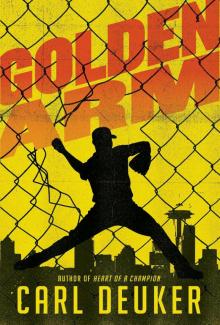 Golden Arm
Golden Arm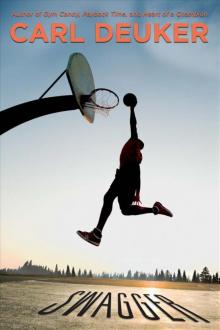 Swagger
Swagger Gym Candy
Gym Candy Night Hoops
Night Hoops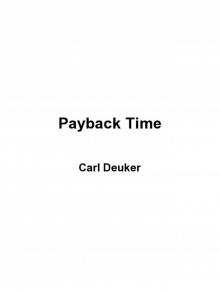 Payback Time
Payback Time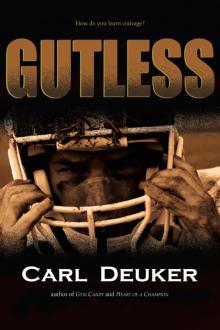 Gutless
Gutless Runner
Runner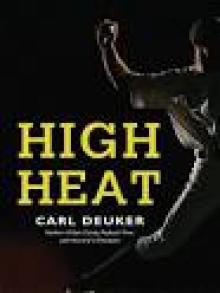 High Heat
High Heat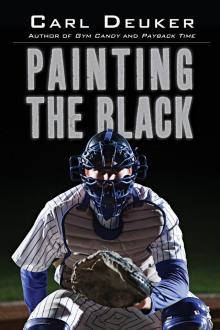 Painting the Black
Painting the Black